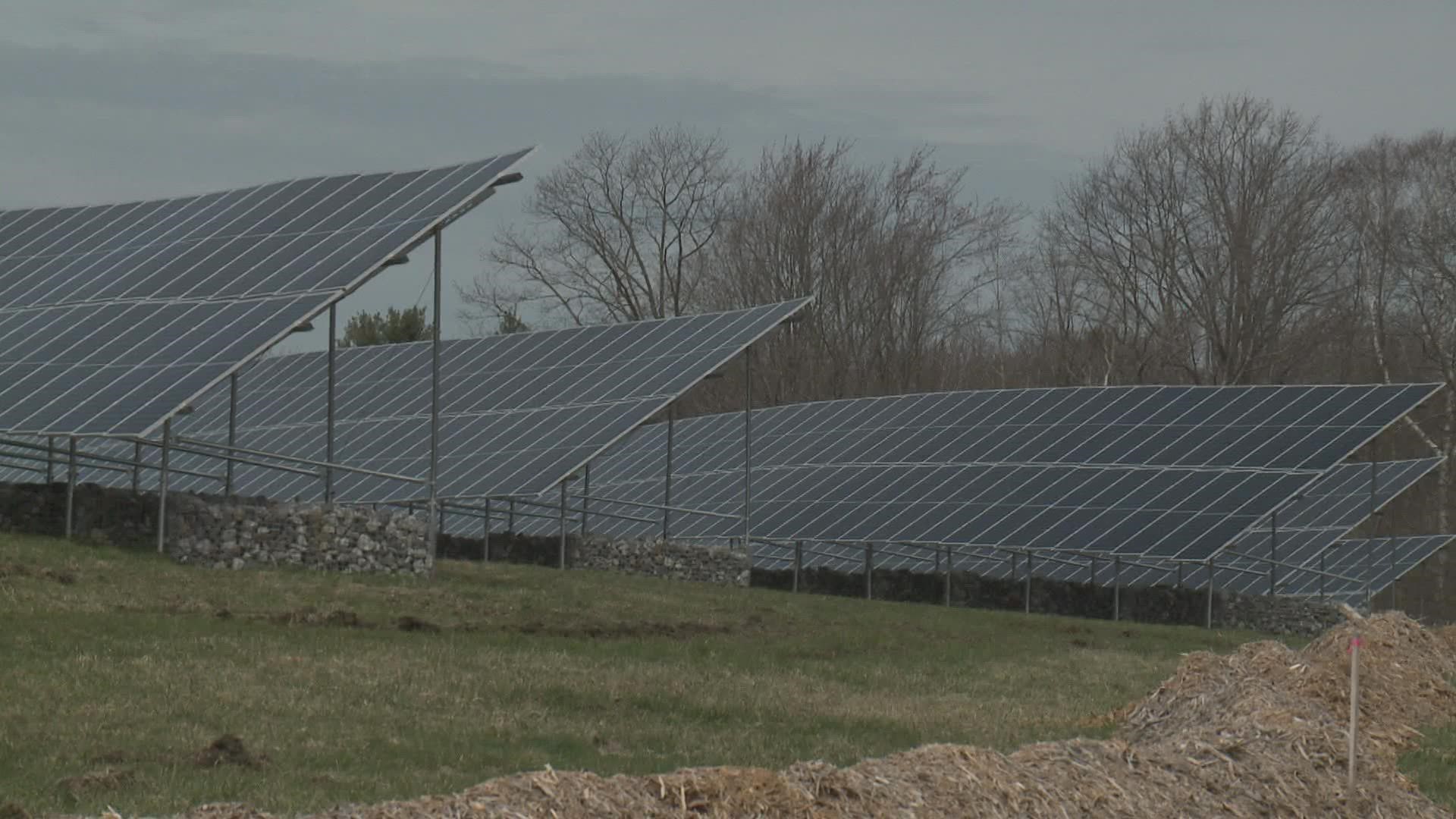PORTLAND, Maine — Nate Curtis stood in the middle of a 12-acre clearing, where he is about to begin construction of a 3.1 megawatt solar farm.
It's one of 17 solar projects he has under development in Maine, most of them “community solar farms” like the one in Bristol, in which subscribers pay for a portion of the electricity it generates.
Curtis said he hopes to have 850 homes and businesses signed up in Bristol.
“We always guarantee 18 to 20 percent savings on the bill, regardless of rate,” Curtis said.
Community solar projects are a category created under a 2019 law passed by the Maine Legislature and signed by the governor to encourage significant growth in renewable energy sources in order to combat climate change.
Community solar projects must be smaller than 5 MW in size, whole other projects can be as large as the available land, financing and electrical system will accommodate.
The law prompted a surge of projects, some of which have been built and are online while others are still being developed.
To encourage that growth, community solar developers are allowed a rate for their electricity that is higher than what larger “grid scale” solar projects can get in the market.
That policy has been generating criticism and is the focus of a bill awaiting action by the Legislature this week.
"The cost is predictably going to cost ratepayers another 20 to 30 percent more than they’re paying now, which is too high," Tony Buxton, a lawyer for industrial clients who use large amounts of electricity, said.
Grid scale projects charge a marketplace rate that is typically around 3.5 to 4 cents per kilowatt hour, but the law passed three years ago ties the price community solar developers get for their power to the price of natural gas, which drives the standard offer price for electricity. Critics have said that higher price is being spread across all ratepayers and is forcing up customer costs.
“If you can get 100 megawatts at 4 cents a kilowatt hour, why in the heck would you buy 5 megawatts at 18 cents a kilowatt hour? And that’s what’s happening,” Sen. Trey Stewart, R-Presque Isle, an outspoken opponent of the policy in the Legislature said.
Maine Public Utilities Commission Chair Phil Bartlett told NEWS CENTER Maine the PUC has been concerned about the cost impact of the law, though he said their studies suggest the cost increase would be about 10 percent on customer bills, once the majority of projects come online in the next two years.
Not surprisingly, solar energy advocates have said cost increases are not going to be a significant problem.
“What we believe is when you weigh the costs and benefits, there are significantly more benefits," Jeremy Payne of the Maine Renewable Energy Association said. "From the private investment to job creation to the resiliency and reliability of the grid being hardened thru private investment, we think it outweighs any costs of the program.”
Sen. Mark Lawrence, D-York, is a supporter of community solar plans.
"It's the way to diversify the energy supply so we don’t see what’s going on now with price spikes, because we are so reliant on carbon-based fuel,” Lawrence, who is co-chair of the Energy, Utility and Technology Committee, said.
He also acknowledged the price problem with the current law and has helped create a bill to be voted on this week that would cut the ties to natural gas prices and also roll back the prices paid for community solar power.
“Essentially this will carve off another 30 percent of the cost and make these projects more feasible from a cost point,” Lawrence said.
Stewart indicated he is also supporting those changes.
If that bill passes, it will be one more change for Maine’s ongoing effort to create state policy that will target climate change. The immediate goal is to have a major share of Maine’s electricity come from renewable sources by 2030, which supporters agree will require more renewable projects to be built over the next eight years.
Solar developer Nate Curtis said there may be some cost increases required but that there is a different price to be paid if the state takes no action.
“I think there will be costs, of course … but they are outweighed [by] the costs if we don’t tackle the issues of climate change.”
Lawrence agreed.
“Doing nothing is not free either, because of what’s going on with carbon based electricity, and that will only rise in the future," Lawrence said.

